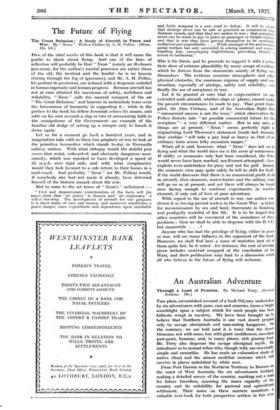The Future of Flying
ONE of the chief merits of this book is that it will cause the public to think about flying. And one of the lines of reflection will probably be that " Neon " (surely an ill-chosen pen-name, for the author's mental processes are rather those of the old, the hesitant and the fearful—he is no beacon shining through the fog of ignorance), and Mr. A. H. Pollen, his partner in pessimism, are imbued with a desperate unbelief in human ingenuity and human progress. Because aircraft has not at once attained the maximum of safety, usefulness and reliability, " Neon " calls the nascent conquest of the air " The Great Delusion," and laments in melancholy tones over the fatuousness of humanity in supporting it ; while in the preface to the book his fellow-Jeremiah echoes his moans, and adds on his own account a slap or two at unreasoning faith in the omnipotence of the Government—an example of the familiar old dodge of setting up a ninepin only to knock it down again.
Let us for a moment go back a hundred years, and in imagination take with us these two prophets of woe to look at the primitive locomotive which stands to-day in Newcastle railway station. With what obloquy would the doleful pair cover that weird, unheard-of, and obviously dangerous mon- strosity, which was reported to have developed a speed of 35 m.p.h. over rigid rails, and with what complacency would they look forward to a safe return to their homes in a 'nail-coach. And probably " Neon " (or Mr. Pollen) would, if somebody else had not made it already, have delivered himself of the historic remark about the cow.
But to come to the set terms of " Neon's " indictment :—
" 'Cool and. dispassionate consideration of the facts will (he says) show that air power' is illusory and ' air supremacy' a will-o'-the-wisp. The development of aircraft for war purposes is a sheer waste of men and money, and moreover constitutes a grave danger, since expenditure and dependence upon unreliable and futile weapons is a sure road to defeat. It will be shown that airships never can be safe or practical as commercial Ion, distance vessels, and that they-are useless in war ; that-aeroplan; never can be made to pay in peace as passenger or freight-earriern, and that in war they have proved themselves to be unreliable, ineffective and unprofitable. . . . While prodigal of life and trosnom aerial warfare has only succeeded in sowing mistrust and enmity, breeding fear, encouraging frightfulness, provoking thereby return to barbarism."
This is his thesis, and he proceeds to support it with a prima facie show of extreme plausibility by many scraps of evidence which he derives from the statements mainly of flying men themselves. The evidence concerns atmospheric and other physical obstacles, the enormous expense of supply and con- struction, especially of airships, safety and reliability, and finally the use of aeroplanes in war.
Let it be granted at once that as cargo-carriers on any extended scale aircraft, whether ships or 'planes, cannot under 'the present circumstances be made to pay. That great trade- pilot, Sir Alan Cobham, said of his Australian flight that " commercial success is not the issue," which observation Mr. Pollen distorts into " no possible commercial future for the aeroplane "--a very different matter. But in any ease, as things are at present, " Neon " seems perfectly right in stigmatizing Lord Thomson's statement (made last January, that airships " will take a pay load as heavy as that of an ordinary train across lofty mountain ranges."
When all is said, however, what " Neon " does not see in flying and what the world does see is the sense of achievement. If utility or economics only had been considered, the Poles would never have been reached, nor Everest attempted ; these exploits were undertaken for glory and not for pelf. Indeed, the economic view may quite safely be left to shift for itself: if the world discovers that there is no commercial profit at all in aircraft, then steamers; motor-lorries and the railway train will go on as at present, and yet there will always be found men daring enough to continue experiments in another element, if only out of' love of pure adventure.
With regard to the use of aircraft in war, our author con• damns it as having proved useless in the Great War—a failure for reconnaissance by sea and land, inaccurate in bombing, and prodigally wasteful of fine life. It is to be hoped that other countries will be convinced of the soundness of these positions ; then we shall be able to dispense with the BAN.,
but meanwhile . . ?
Anyone who has had the privilege of flying, either in peace or war, will sec many fallacies in the argument of the book. However, we shall find here a mass of statistics (not all of them quite fair, be it noted—for instance, the cost of airships given includes material scrapped at the conclusion of the War), and their publication may lead to a discussion which all who believe in the future of flying will welcome.






























































 Previous page
Previous page